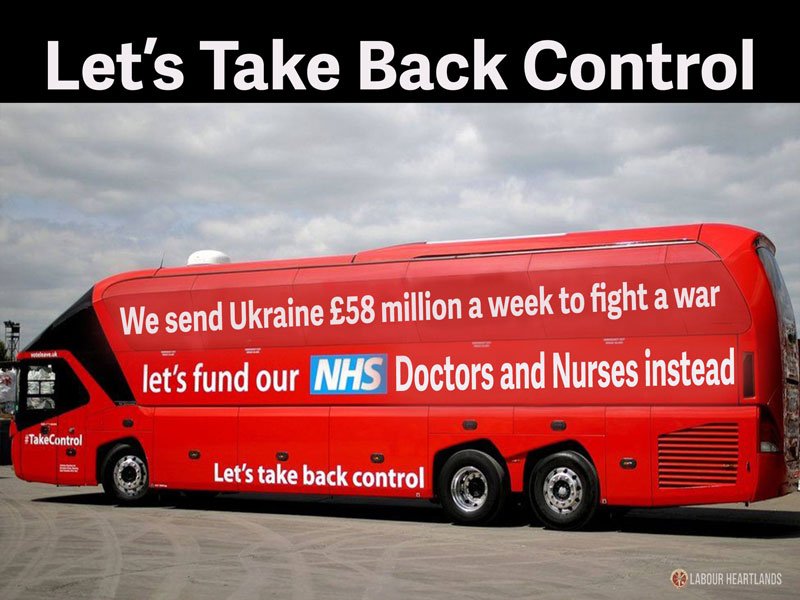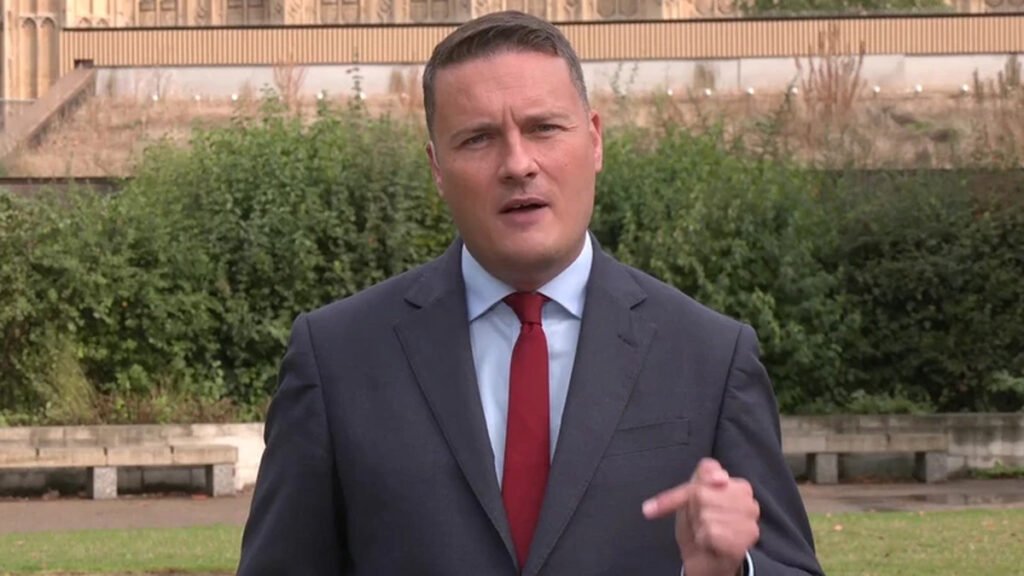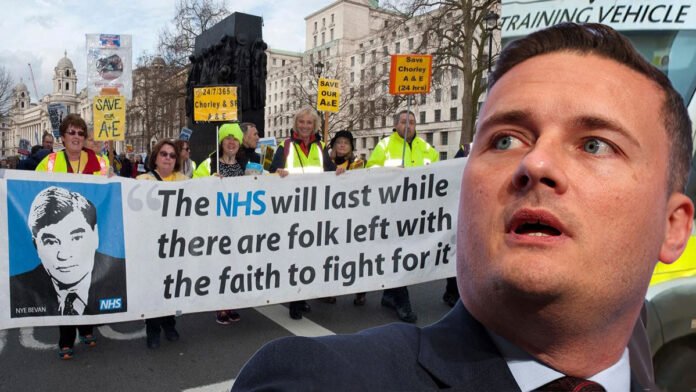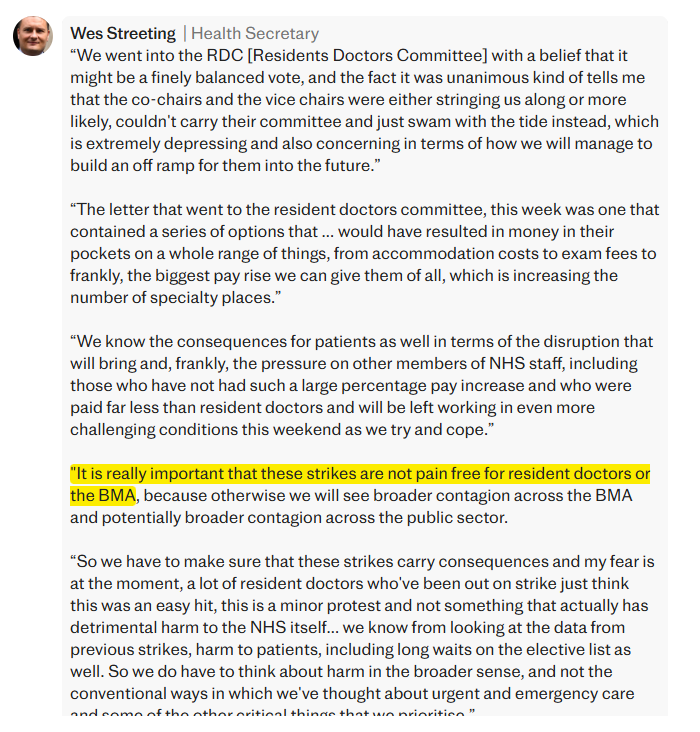Wes Streeting once boasted, “We didn’t have national strikes under the last Labour government” Well, you do now…
What manner of society have we constructed when those who dedicate their lives to healing must withdraw their labour to secure basic dignity? As 50,000 resident doctors across England and Wales prepare for five days of strike action beginning this Friday, we witness not merely an industrial dispute but a fundamental breakdown in the social contract that once bound profession to purpose, service to reward, healer to community.
The stark arithmetic tells its own story. Since 2008, junior doctors, now euphemistically rebranded as “resident doctors”, have seen their real-terms pay collapse by nearly thirty percent. A profession that once guaranteed middle-class security now condemns highly educated professionals to years of financial precarity, forcing many to choose between patient care and personal survival.
Yet Health Secretary Wes Streeting’s response reveals something far more sinister than governmental parsimony. In a leaked transcript of his call with NHS leaders, obtained by Labour Heartlands, Streeting exposed the vindictive psychology underlying his administration’s approach:
“It is really important that these strikes are not pain free for resident doctors or the BMA, because otherwise we will see broader contagion across the BMA and potentially broader contagion across the public sector.”
Here, stripped of diplomatic niceties, lies the naked truth of New Labour’s governing philosophy. The Health Secretary explicitly acknowledges that inflicting suffering upon doctors serves a pedagogical function, teaching other public sector workers what befalls those who dare demand fair compensation. This is not governance but psychological warfare, deployed against the very professionals upon whom our health system depends.
Streeting’s subsequent threat proved even more revealing: “The BMA have misjudged me and this Government and they have squandered a great deal of good will in the process.” The arrogance is breathtaking. Good will? From a government that inherited the most chronically underfunded health service in living memory, that continues to treat healthcare workers as expendable assets while speaking of “efficiency savings” as patients die on trolleys?
The doctors’ demands, a 29.2% increase to restore 2008 pay levels, will be dismissed as unrealistic and economically ruinous. Critics will argue that such increases would bankrupt an already strained system, that other public sector workers possess equally valid claims, and that doctors already enjoy privileged positions compared to many working people.

But this pragmatic framing fundamentally misunderstands the crisis confronting British healthcare. The issue is not whether doctors “deserve” pay restoration, but whether a society can maintain a functioning health system while treating its medical workforce as expendable labour. When junior doctors emigrate to Australia, Canada, or New Zealand, where their skills command proper recognition, they take with them public-funded training, institutional knowledge, and clinical experience that cannot be replaced by management consultants or efficiency drives.
The international disparities that governmental arguments ignore speak volumes. Australian junior doctors earn roughly 50% more than their British counterparts while working shorter hours. Canadian medical residents enjoy superior pay and guaranteed progression. New Zealand offers newly qualified doctors salaries that would be considered generous by British standards. These differences reflect not natural advantages but political choices about the value of medical expertise.
Meanwhile, the government that claims inability to fund proper medical salaries somehow discovers billions for military adventures, corporate tax cuts, and failing transport subsidies. The selective poverty that afflicts public services while private wealth accumulates reveals priorities that no democratic society should tolerate.

The resident doctors’ strike exposes these contradictions with uncomfortable clarity. BMA co-chairs Dr Melissa Ryan and Dr Ross Nieuwoudt articulated the fundamental issue with devastating simplicity: “They won’t accept that they are worth a fifth less than they were in 2008. Our pay may have declined but our will to fight remains strong.”
This statement transcends narrow industrial relations to address questions of social value and professional dignity. When society systematically degrades the compensation of those who heal its sick, it sends unmistakable signals about its priorities. The message is clear: corporate profits matter more than professional expertise, financial engineering matters more than human healing.
The safety concerns raised by both sides deserve acknowledgement. NHS England’s instruction to maintain routine services during the strike risks stretching senior doctors beyond safe limits, potentially compromising patient care in precisely the way the BMA warns. This tragic dilemma illustrates the impossible position into which systematic underinvestment has forced everyone involved: patients, doctors, and the broader health system all become casualties of deliberate resource starvation.
Streeting’s leaked comments about preventing “contagion” across the public sector reveal the government’s strategic thinking with unusual clarity. They understand that conceding fair pay to doctors would establish precedents that other public sector workers might reasonably expect to follow. The logic of austerity demands that each group be isolated, demonised, and defeated separately, preventing the broader solidarity that might challenge the entire system of managed decline.
Yet this approach contains fatal contradictions. A health system dependent upon professional goodwill cannot survive indefinitely on coercion and threats. Medical expertise cannot be replaced by reorganisation. When doctors emigrate, their knowledge departs with them, leaving behind expensive training facilities and empty hospital wards that no amount of efficiency measures can remedy.
The depressing reality is that a Labour government handles industrial disputes no differently than the Tories. Boss first, workers last, the eternal formula of British governance regardless of which rosette adorns the Treasury benches.
Streeting’s vindictive threats could have emerged verbatim from any Conservative Health Secretary’s playbook, proving that the party’s transformation into a managerial outfit serving corporate interests rather than working people is now complete.

This continuity between Conservative and Labour approaches reveals the deeper pathology affecting British politics. The neoliberal consensus that treats public services as burdens rather than investments, that views professional expertise as expendable commodity rather than social asset, transcends traditional party divisions. Whether Tory or Labour, governments sing from identical hymn sheets when confronting those who demand fair treatment.
The broader implications extend beyond immediate healthcare concerns. When a Labour government threatens public sector workers with punitive consequences for asserting their professional worth, it signals the complete abandonment of social democratic principles. The party that once championed workers’ rights now employs the same psychological warfare tactics perfected by Conservative predecessors.
The path forward requires recognition that healthcare represents a public good rather than a commercial service. Proper medical care cannot be delivered by exhausted professionals working under impossible conditions for inadequate compensation. The false economy of medical underpayment creates genuine costs in emigrated expertise, delayed treatments, and compromised patient safety that far exceed the savings achieved through pay restraint.
We must demand immediate government capitulation to the doctors’ core demands while acknowledging that this represents merely the first step toward comprehensive NHS reform. Pay restoration alone cannot address the systematic underfunding, bureaucratic micromanagement, and political interference that have brought British healthcare to the brink of collapse.
More fundamentally, we must reject the politics of scarcity that treats public investment as unaffordable while private wealth accumulates without limit. A society that spends hundreds of billions on financial speculation while claiming inability to fund proper medical salaries has revealed its true priorities with devastating clarity.
The resident doctors walking out on Friday morning carry with them not merely professional grievances but democratic hopes. Their willingness to sacrifice immediate income for long-term dignity offers a template for resistance that other public sector workers might follow. When those who heal refuse to accept their own degradation, they perform essential surgery on the body politic itself.
The question facing the rest of us is whether we possess sufficient wisdom to support them. The doctors’ strike represents more than industrial action; it constitutes an antibody response to the infection of organised indifference that has poisoned public life. Whether this treatment proves effective will depend not merely on governmental concessions but on our collective willingness to demand healthcare that serves human need rather than accountants’ spreadsheets.
Until we apply these remedies, expect more strikes, more doctors emigrating for better rewards, and more suffering, not from medical professionals who have chosen rebellion, but from political leaders who have chosen managed decline over democratic governance. The doctors understand what their political masters refuse to acknowledge: that healing, like democracy itself, requires investment, respect, and the recognition that some things matter more than money.
Support Independent Journalism Today
Our unwavering dedication is to provide you with unbiased news, diverse perspectives, and insightful opinions. We're on a mission to ensure that those in positions of power are held accountable for their actions, but we can't do it alone. Labour Heartlands is primarily funded by me, Paul Knaggs, and by the generous contributions of readers like you. Your donations keep us going and help us uphold the principles of independent journalism. Join us in our quest for truth, transparency, and accountability – donate today and be a part of our mission!
Like everyone else, we're facing challenges, and we need your help to stay online and continue providing crucial journalism. Every contribution, no matter how small, goes a long way in helping us thrive. By becoming one of our donors, you become a vital part of our mission to uncover the truth and uphold the values of democracy.
While we maintain our independence from political affiliations, we stand united against corruption, injustice, and the erosion of free speech, truth, and democracy. We believe in the power of accurate information in a democracy, and we consider facts non-negotiable.
Your support, no matter the amount, can make a significant impact. Together, we can make a difference and continue our journey toward a more informed and just society.
Thank you for supporting Labour Heartlands










